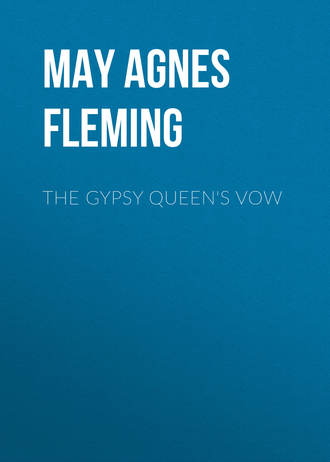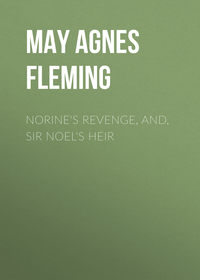 полная версия
полная версияThe Gypsy Queen's Vow
“How is Ray?” was Pet’s first question.
“Just as he was this morning. Where are you going, Pet?”
“He is no worse?”
“No. Are you going away?”
“Has the doctor been here since?”
“Yes, he has just gone. Where are you going, Pet?”
“Oh – to school!”
“To school! going away!” echoed Erminie in dismay.
“Yes; going to a dismal old boarding-school, where I am to walk, talk, eat, pray, and sneeze by rule. Ain’t it nice?”
“Oh, Pet, I am so sorry!”
“Well, I’m not! I expect to have a real nice time. Everybody mightn’t see the fun of it; but I do! I intend to finish my education, and be back in a week!”
“Oh, Pet! I don’t know what I shall do when you are gone; I will be so lonesome,” said Erminie, her sweet blue eyes filling with tears.
“Why, didn’t I tell you I’d be back in a week? I will, too. There’s an old dragon there, Mrs. Moodie – I’ve heard of her before – and she’s to hammer learning into me. Oh, I’ll dose her!”
“Won’t you write me a letter, Pet?” said Erminie, who was sobbing now, and clinging to her friend’s neck.
“To be sure I will, and I’ll bring it myself, to save postage. Don’t you be afraid, Minnie. I can take care of Pet Lawless, and won’t let her be put down by no one. Good-by, now; I’ve only got five minutes, and I guess they’re up by this time. Now don’t cry and take on, Minnie; you’ll see I’ll learn so fast that I’ll be sent home finished in a week!”
And with these mysterious words, Pet gave Erminie a parting kiss, and ran from the cottage just as the judge put his head out from the carriage to call her.
The journey now proceeded uninterruptedly. They remained that night at a hotel, and continued their journey next morning.
A little after noon, they reached the four-story building where Mrs. Moodie kept her costly and exclusive boarding establishment for the young female aristocracy of the land, and “trained up” (as her circulars had it) the rising female generation in all the branches of an English, French, musical, and religious education.
Judge Lawless and his daughter were shown into a magnificently-furnished drawing-room, where a “cullud pusson” took the gentleman’s card and went off in search of the proprietress (if the word is admissible) of the establishment.
Fifteen minutes later, the rustle of silk resounded in the hall. Pet drew herself up straight as a ramrod, compressed her lips, cast down her eyes, folded her hands, and looked the very picture of a timid, bashful, shy little country-girl. Then the door opened, and magnificent in a four-flounced plaid silk, with a miraculous combination of lace and ribbons floating from her head, a tall, yellow, sharp-looking lady of middle-age floated in, and with a profound courtesy to the judge that made her four flounces balloon out around her, after the fashion of children when making “cheeses,” dropped into a sofa, half-buried in a maze of floating drapery.
“This is Miss Lawless, I presume?” said Mrs. Moodie, with a bland smile and a wave of her hand toward Pet.
“Yes, madam, this is my daughter; and I consider it my duty to tell you beforehand that I am afraid she will occasion you a great deal of trouble.”
“Oh! I hope not! You are a good little girl – are you not, my dear?” – with a sweet smile to Pet. “In what way, may I ask, my dear sir?”
“In many ways, madam. She is, in the first place, unbearably wild, and rude, and self-willed, and – I regret to say – disobedient.”
“Is it possible? I really would never have imagined it!” cried the lady, glancing in surprise and incredulity toward the shy, quiet looking little girl, sitting demurely in her chair, and not venturing to lift her eyes. “I think I have tamed far more desperate characters than this; in fact, I may say I know I have. Oh! I will have no trouble with your little girl! Why, she is one of the quietest looking little creatures I think I ever saw.”
The Judge glanced toward Pet, and was half inclined to fly into a rage at discovering her so unlike herself, giving the direct lie, as it were, to his assertions.
“Come over here, my love,” said the lady, holding out her hand with a bland smile to Pet. “I want to see you.”
Pet, after the manner of little girls when they are frightened or embarrassed, instead of complying, rubbed her knuckles into her eyes, and pretended to cry.
“Get up, and do as you are told! How dare you act so?” said the judge, forgetting his “company manners” in his rage at what he could easily see was clever acting on Pet’s part.
“Now, pray, my dear sir, don’t frighten the poor little thing,” cried the dulcet tones of the lady. “Little girls are always nervous and frightened when first sent to school. Come here, my love; don’t be afraid of me!”
“Go!” thundered the judge, with a brow like a thunder-cloud.
Pet, still sniffling, got up and went over to Mrs. Moodie.
“What is your name, my dear?” smiled the lady, taking Pet’s little brown hand in her own snowy fingers.
“Pet-Pet-ronilla,” sobbed the elf.
“Now, you must not cry, dear; we will take the best of care of you here. Of course, you will miss your papa for a few days; but after that we will get along very nicely. Were you ever at school before?”
“Ye-es, ma-am.”
“What did you learn, love?”
“I don’t know.”
“Petronilla?” sternly began the judge.
“Now, pray, my dear sir,” remonstrated the silken tones of the lady, “leave it to me. Just see how you are frightening the poor little thing. You can read, my dear, of course!”
“Yes, ma-am.”
“What books have you read, love? have you read many?”
“Yes, ma’am.”
“What was their names?”
“‘Jack and the Bean-stalk;’ ‘The Goose with the Golden Egg;’ ‘Little Red – ’”
“Oh! my dear, I don’t mean those! Have you read nothing else?”
“No, ma’am; only a spelling-book.”
“Can you write?”
“Yes, ma’am, when somebody holds my hand.”
“Have you studied grammar and geography? I suppose not, though.”
“She has, madam; at least she commenced,” said the judge.
“Ah, indeed! What is English Grammar, love?”
“A little book with a gray cover,” said Pet.
“No, no! What does English Grammar teach?”
“I don’t know – it never teached me anything; it was Mr. Hammer.”
“Oh, dear me! You are rather obtuse, I fear. Perhaps you know more of geography, though. Can you tell me how the earth is divided?”
“It ain’t divided!” said Pet, stoutly. “It’s all one piece!”
“Ah! I fear your teacher was none of the best,” said the lady, shaking her head. “We shall have to remedy all these defects in your education, however, as well as we can. I hope to send you a very different little girl home, judge.”
“I sincerely hope so,” said the judge, rising. “Farewell, madam. Good-by, Petronilla; be a good girl – remember.”
“Oh, I’ll remember!” said Pet, significantly, accepting her father’s farewell salute, with a great deal of sang froid.
Mrs. Moodie politely bowed her stately guest out, and then turning to Petronilla, said:
“The young ladies are all in the class-room studying, my dear. Would you prefer going there, or shall I have you shown to your room?”
“I’ll go where the girls – I mean the young ladies are,” said Pet, following the rustling lady up-stairs.
“Very well, this way, then,” said madam, turning into a long hall with large white folding-doors at the end, through which came drowsily the subdued hum of recitation.
“Well; I think I have done the bashful up beautifully!” mentally exclaimed Petronilla. “I reckon I’ve amazed papa. Maybe I won’t surprise them some if not more, before this night’s over. Oh! won’t I dose them, though?”
And, chuckling inwardly, our wicked elf followed the stately Mrs. Moodie, who marched on ahead, in blissful ignorance of the diabolical plot brewing in Pet’s mischief-loving head.
CHAPTER XXI.
PET BEGINS HER EDUCATION
“A horrid specter rises to my sight.”“I hear a knocking in the south entry.Hark! more knocking!”– Macbeth.Throwing open the folding-doors, Mrs. Moodie passed into the school-room, closely followed by Pet.
It was a long, high, wide room, with desks running round the walls, and maps, globes, books and slates scattered profusely around. Before each desk was a chair, and some sixty girls of all sizes and sorts sat now busily conning their lessons.
Two or three teachers sat in various directions, round the room, before little tables, with their eyes fixed on the students, ready to note down the slightest infringement of the rules.
It was seldom the commander-in-chief of the establishment swept her silken flounces through the hot, dusty classe; and now, according to the long-established rule, teachers and pupils rose simultaneously, and courtesied profoundly to that august lady. Then every eye in sixty-three heads turned and fixed themselves upon the new pupil with that sharp, searching, unpitying stare that only school-girls understand. Petronilla, however, was not in the remotest degree troubled with that disagreeable failing, yclept bashfulness; and glancing round composedly, she swept the whole room at a glance, and returned every stare with compound interest.
“Young ladies,” said Mrs. Moodie, with a graceful wave of her hand toward Pet, “this young lady is Miss Petronilla Lawless, of Judestown, and will be your future companion and fellow-pupil. I hope you will be mutually pleased with each other, and try to make her at home among you as soon as possible. Miss Sharpe she will enter your division.”
And, with a stately bow of her beribboned head, Mrs. Moodie rustled loudly from the room, while teachers and pupils again bowed in deepest reverence.
Pet gave an assenting nod to Mrs. Moodie’s remarks, which had the effect of making two or three of the young ladies, indulge in a little giggle behind their handkerchiefs. Then, from a distant corner, came a small, keen, wiry-looking human terrier, known by the appropriate cognomen of Miss Sharpe, who immediately laid hands upon Pet, saying:
“Miss Lawless, come this way. You are to enter my class.”
Pet, as good a physiognomist as ever lived, raised her keen eyes to the cantankerous face of the cross-looking old young lady, and conceived, upon the spot, a most intense dislike to her. The other girls, at a silent motion from their teachers, had dropped into their seats, and resumed their studies – still, however, covertly watching the new pupil with all a schoolgirl’s curiosity.
Pet was led by sharp Miss Sharpe to the remote corner from whence she had issued, and where sat some dozen or two “juvenile ladies,” all smaller than Pet. Miss Lawless looked at them a moment in indisguised contempt, and then stopped short, jerked herself free from Miss Sharpe’s grasp, and coming to a sudden stand-still, decidedly began:
“I ain’t a-going to sit among them there little things. I want to go over there!”
And she pointed to where a number of young ladies, whose ages might have varied from seventeen to twenty, sat in the “First Division.”
A very little thing will produce a laugh in a silent school-room, where the pupils are ever ready to laugh at anything a new scholar does or says; and the effect of this brief speech was a universal burst of subdued laughter from the sixty “young ladies” aforesaid.
“Well, you can’t go there!” said Miss Sharpe, sharply, looking daggers at Pet. “You are to sit in my division – which is the lowest!”
“Yes, I see it is,” said Pet; “but you needn’t get so cross about it. I should think, when my papa pays for me, I could sit wherever I like. I’m sure this hot old room, without even a carpet on the floor, ain’t much of a place to sit in, anyway.”
Another universal laugh, louder than the first, followed this; and the sixty pairs of eyes flashed with wicked delight – for Miss Sharpe was the detestation of the school.
“Silence!” called the head monitor, sternly.
Miss Sharpe clutched Pet’s shoulder with no gentle hand, and jerked her into a seat with an angry scowl.
“You must keep silence, Miss Lawless,” she began, with asperity. “Young ladies are not allowed to talk in the class-room. You will have to sit wherever you are placed, and make no complaints. Such rude behavior is not allowed here. Hold your tongue, now, and read this.”
Hereupon she took from her table the “First Book of Lessons,” and put it into Pet’s hand, with another scowl, darker, if possible, than the first.
Pet took it, and holding it upside down for a while, seemed to be intently studying, thinking all the while that life in a school-room was not only as pleasant, but considerably pleasanter, than she had anticipated.
But for Pet Lawless to keep silent any length of time was simply a moral impossibility; so, finding the cross teacher’s lynx eyes turned for a moment the other way, she bent over toward her next neighbor, a little red-eyed, red-haired girl, about her own age, and whispered, in strict confidence, pointing to Miss Sharpe:
“Ain’t she a horrid cross old thing?”
But the young lady only glanced askance at the audacious little law-breaker at her side, and edged nervously away from her.
Petronilla not being easily affronted or slighted, however, came close to little red-head, and holding her book to her mouth, whispered again:
“Does she ever whip you or anything? She looks cross enough to do it. Ain’t it awful, coming to school?”
Seeing there was no escape from her persecutor, red-head thrust her knuckles into her eyes and began to cry.
“What’s the matter now?” said the teacher, turning sharply round, and looking threateningly at Pet.
“Why, Miss Sharpe, she keeps a-talking to me all the time and won’t stop,” whispered the unhappy owner of the red hair.
“What is she saying?” said Miss Sharpe, in a quick, irritated voice, that strongly reminded Pet of Dismal Hollow and Miss Priscilla Toosypegs.
“She – she – she says you’re a – a – a horrid cross old thing, please, ma’am!” wept the little one, digging her knuckles still further into her eyes.
Miss Sharpe’s face grew black as a thunder-cloud – owing to her peculiar complexion, she generally blushed black or deep orange. In all her thirteen years’ teaching, she had never encountered a pupil who had dared to call her a “horrid cross old thing” before. Old! – that was the the worst. To be called so before the whole school, too! Miss Sharpe sat for one awful moment perfectly speechless with rage, and so black in the face that there seemed serious danger of her bursting a blood-vessel on the spot.
Once again a loud laugh, that would not be restrained, came from the sixty pretty mouths of the sixty young ladies so often spoken of. Even the teachers, although they sternly called “silence!” were forced to cough violently to hide the smile that was creeping over their faces at Miss Sharpe’s rage.
Meantime, our dauntless Pet sat with a sort of head-up-and-heels-down look, that was a sight to see; her arms akimbo, and her bright black eyes blazing with defiance, daringly riveted on the face of the justly-offended teacher.
“Did – did you dare to say that, you – you impudent, impertinent – young saucy – ”
“Abandoned, outrageous son of a gun!” put in Pet, composedly.
“Silence! Did you dare to call me that – that name?”
“I didn’t call you any name – I said you were a horrid cross old thing; and I’ll leave it to everybody here if you ain’t! I ain’t used to hold my tongue – and I’m not going to do it, either!” said Pet, all ablaze with defiance.
Miss Sharpe sat unable to speak, her rage almost swamped in her utter amazement. In all her experience she had never come across so desperate and utterly depraved a case as this. Every book was dropped, and every eye fixed on Pet. Even the other teachers, unable longer to repress their smiles, exchanged glances of surprise, and watched with interest and curiosity, the little original, who sat staring at Miss Sharpe as if for a wager.
“I – I won’t endure this! I am not to be insulted in this manner!” said Miss Sharpe, rising passionately. “I’ll go and report her to Mrs. Moodie; and either she or I must leave this class.”
“My dear Miss Sharpe, be calm,” said the head teacher, a pleasant-faced young girl, as she rose and came over. “There is no use in troubling Mrs. Moodie about the matter. This little girl, you perceive, has been indulged and spoiled all her life, and cannot readily submit to authority now. My dear,” she added, turning to Pet, “you must sit still and not talk. It is against the rules; and you perceive you are giving Miss Sharpe a great deal of trouble.”
“Well, so is she, just as bad! She’s giving me a great deal of trouble, too! I want to go and sit in your class.”
“But you can’t sit in my class, Miss Lawless. You must keep the place allotted you. Little girls should be docile and obedient, you know, and do as they are told. Will you sit still now, and be quiet?”
“Yes; if she lets me alone!” pointing to Miss Sharpe.
“You must do as your teacher says, child. Now, do be a good little girl, and don’t talk.” And the sweet-voiced young lady patted Pet’s black curly head kindly, and went back to her place.
Miss Sharpe, looking as if she would like to pounce upon Pet, and pound the life out of her, relapsed scowling into her seat; and Pet, curling her lip contemptuously at the cross teacher, took a lead pencil out of her pocket and began amusing herself drawing caricatures of her all over the book she held in her hand.
A profound silence again fell on the hot, close classe, and the girls bent over to-morrow’s tasks; now and then however, smiling slyly at each other, and glancing significantly at the new-comer, whose short half-hour in school had already created a sensation quite unparalleled in all the past history of the establishment, and which was destined to fill sixty letters home to “papa and mama” next time they wrote. Then, in half an hour more, a bell loudly rung, and every girl jumped eagerly up. This was the signal that school for the day was dismissed; and books, slates and pencils were hustled hastily out of sight; and two by two the girls marched through the now open folding-doors, beginning with the tallest, through the long hall staircase, through another hall, out of a side-room, and into an immense play-ground, furnished with wings, skipping-ropes, hoops and everything else necessary for recreation and amusement.
But no longer were hoops, and swings, and skipping-ropes seized with loud shouts as heretofore; newer and more attractive game was in view now, and every one crowded around our Pet, surveying her with open eyes as if she were some natural curiosity.
But Pet had no intention of standing there to be looked at and cross-questioned; and breaking through the ring with the yell of an Ojibewa Indian, she sprung into one of the swings, and invited “some of ’em to come and swing her.”
Like hops in beer, Pet’s presence seemed to throw the whole assembly in a ferment hitherto unknown. The swings flew wildly; the skipping-ropes went up and down with lightning-like velocity; the hoops whirled and flew over the ground in a way that must have astonished even themselves, if hoops ever can be astonished. The girls raced, and ran, and skipped, and laughed as they had never done before; and the noise and uproar waxed “fast and furious.” And wherever the fun was highest, the laughter loudest, the excitement wildest, there you might find Pet, the center and origin of it all. Cross Miss Sharpe, who had been sent out to look after them, and see that none of them broke their necks, if possible, wrung her hands in despair at the awful din, and rushed hither and thither, scolding, shaking, threatening, and vociferating at the top of her lungs; but all in vain. They were every one going crazy – that was evident; and that little minx, who had come there that day to throw the whole school in convulsions, was the cause of it all.
But even school-girls, with lungs, and throats, and faces very often of brass, must get exhausted at last; and after an hour’s steady screaming and yelling, the whole assemblage shrieked, laughed and shouted themselves into hoarseness and comparative quiet.
Pet, somewhat fatigued after her exertions, was seated in the midst of a group of girls, telling, in solemn tones, a most awful “raw-head and bloody bones” ghost story, which she “made up” as she went along, and which was destined to deprive at least twenty little individuals of a wink of sleep that night.
Every one was bending eagerly forward, listening breathlessly to Pet, who had just got “Jack” into the “haunted castle,” and was announcing the coming of a “great big black man, with red-hot coals for eyes, and flames of fire coming out of his mouth,” when a thin, sharp shadow fell over them, and, looking up with a terrified start, they beheld Miss Sharpe standing over them.
“What is she talking about now?” queried that lady, with no very amiable glances toward Pet.
“She’s telling a ghost story; that’s what she’s talking about!” said Pet, instantly beginning to be provoking.
“Ghosts!” said Miss Sharpe, turning up her nose though nature had already saved her the trouble. “Such stuff! You must not terrify the children by telling them such things, little girl.”
“It’s not stuff!” said Pet; “It’s as true as preaching. I’ve seen lots of ghosts myself. There, now!”
“Miss Lawless, do you know where little girls that tell fibs go to?” said Miss Sharpe, sternly.
“Yes, the same place you’ll go to, I expect,” said Pet, pertly; “but I ain’t telling fibs – I never do. And I have seen plenty of ghosts, too. There’s a whole settlement of them out where we live. I only wish I had brought some of them to school with me, and then you would see. That’s all!”
“You naughty little girl!” said Miss Sharpe, angrily. “How dare you tell me such a story? You have seen ghosts, indeed! Why, everybody knows there is no such thing.”
“What do you bet there’s not?” said Pet.
“Miss Lawless, you forget to whom you are speaking!” said Miss Sharpe, with dignity.
“No, I don’t; I know very well to whom I am speaking,” said Pet, imitating her tone; “and I know just as well there are ghosts. They’re great, tall, thin people, in white, with hollow eyes, that come at midnight and scare people. I’ve seen them, and I guess I ought to know.”
Miss Sharpe, disdaining an altercation with the elf, who was already bristling up in anticipation of a controversy, turned and walked away majestically, or, at least, as majestically as her four feet eight inches would allow.
Pet looked after her with a boding eye that told wonderful tales, if she could only have read it; but she contented herself with mentally exclaiming:
“Oh, I’ll dose you! Maybe you won’t see a ghost tonight, old Miss Vinegar.”
“There, now, go on with the story,” chorused half a dozen voices, when Miss Sharpe was gone.
“See here,” said Pet, without heeding the request, “where does she – Miss Sharpe I mean – sleep at night?”
“With us,” said one of the small girls, “in the children’s dormitory. The large girls have rooms to themselves, every two of them; but we sleep in a long room all full of beds, and Miss Sharpe sleeps there, too.”
“Hum-m-m! Do you know where I am to sleep?”
“Yes; all Miss Sharpe’s division sleep in the children’s dormitory. You’ll be there.”
“Um-m-m! I should like to see the place. Would we be let?”
“Oh, yes. If you can get one of the girls in the First Division to go with you, she can take you all over the house.”
Off ran Pet, and without much difficulty she persuaded one of the First Division girls to show her through the house.
The first place they visited was the children’s dormitory. This was a long room, with rows of white-curtained beds on either side for the children, and one larger than the rest, at the further end, for Miss Sharpe. Small washstands and mirrors were scattered around, and near each bed was placed a small trunk belonging to the children.
Pet scanned these arrangements with a thoughtful eye. Then, turning to her cicerone, she said:
“In which of the beds am I to sleep?”
“In this one,” said the girl, indicating one at the extreme end of the room, opposite Miss Sharpe’s. “The room was full; so they had to put it close to the window, and you will have a chance to see everybody that passes.”
Pet went over to examine. Within a few inches of the bed was a window overlooking the street. It was partly raised now, and Pet thrust her head out to “see what she could see,” as they say. The first thing that struck her was the fact that the window was in a straight line above the hall door, and only removed from it the distance of a foot or two. Instantly a demoniacal project of mischief flashed across her fertile brain; and as she withdrew her head her wicked eyes, under their long, drooping lashes, were fairly scintillating with the anticipation of coming fun.






